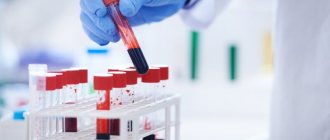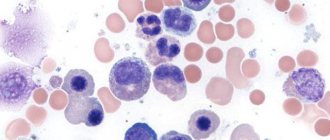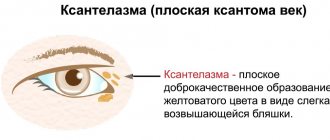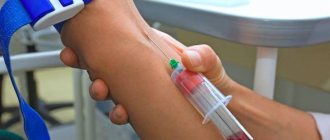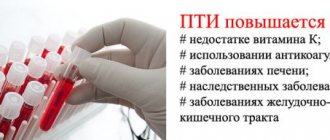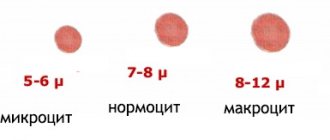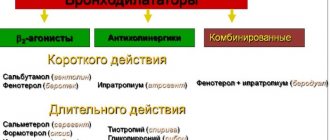What is ACCP?
Testing for antibodies to CCP is a modern and effective test used for early diagnosis of a disease such as rheumatoid arthritis. This is an autoimmune inflammation in the joints with the gradual formation of degenerative and dystrophic changes in their tissues.
A blood test for ACCP is very effective; it helps to identify antibodies long before characteristic symptoms appear; within a year or a year and a half, the test can show whether the disease is developing or not. At this time, antibodies to cyclic citrullinated peptide are already present in the blood.
A blood test for ACCP is indicated:
- In order to identify seronegative forms of the disease;
- For differential diagnosis of diseases that are associated with joint changes;
- In order to assess the possible risks of developing deformation changes in tissues;
- Another area of application of the analysis and its interpretation is in early forms of arthritis so that the prescribed treatment is as effective as possible.
Other examination methods detect the disease much later, when the pathological process that has begun is much more difficult to stop.
Features of the ACCP study
The importance of CCP antibodies lies in their high sensitivity and specificity in RA. Specificity is higher than that of rheumatoid factors; it reaches almost 100%. This allows accurate assessment of RA and facilitates treatment planning. ACCP tests also allow conclusions to be drawn regarding the course of the disease and the extent of possible joint damage in RA.
They also serve as early markers of the disease, as they can detect it 10 years before the first symptoms. A doctor can decipher the results according to the standards. You should not look for indicators from the tables yourself.
Severe RA
Advice! Interpretation of the results should only be carried out by a doctor. It is strictly forbidden to independently diagnose and treat yourself. The thoughtless use of folk remedies or medications can lead to negative consequences. The final assessment of the upper limits should also be made by a specialist.
Similar:
- Causes of seronegative rheumatoid arthritis, treatment methods, symptoms, prevention and complications
- Causes of Lasegue syndrome, diagnostic methods, information content of the symptom and subsequent examinations
- What you need to know when treating seropositive rheumatoid arthritis, factors and symptoms
- Causes of systemic inflammatory joint disease, risk factors, symptoms, diagnostic methods, treatment and prevention
- Features of the appearance of rheumatoid factor in special blood tests, preparation for the examination, information content and diagnostic value of the study
- Indications for MRI examination of the maxillofacial joints, contraindications, preparation, interpretation and information content of the examination
- What does ultrasound show when examining knee joints, the course of the procedure, preparation, interpretation of results and comparison with other methods
Antibodies in disease diagnosis
ACCP is prescribed if the patient has complaints of joint pain and if there are signs of rheumatoid arthritis.
ACDC analysis is prescribed for the following conditions:
- For edema, hyperemia, swelling of the hands, wrists, elbow, knee, ankle joints with symmetrical lesions;
- When movement in the joints is limited, bone joints are stiff, when the shape and size of the joint do not change;
- For joint pain of unknown nature, when the source of pain cannot be determined by x-ray or computed tomography;
- For existing hereditary diseases of autoimmune origin;
- If you have a genetic predisposition to such diseases, if the HLA gene is identified;
- If there are signs of rheumatoid arthritis with positive tests for rheumatoid tests;
- If a diagnosis has already been made, to prescribe appropriate treatment.
The ACCP assay is highly specific. Other diseases cannot be the cause of an increase in antibodies to citrulline; the probability of having rheumatoid arthritis is 99%; the ACCP test gives a negative result in other non-autoimmune pathologies in the joints.
ACCP is a marker that ensures the efficiency and accuracy of diagnosis. Thanks to the research, early treatment is possible; it is aimed at suppressing negative processes and helps prevent degenerative changes in the joints and disruption of their motor function.
What kind of research method is this?
ACCP is a specific test through which it is possible to identify signs of the rheumatoid process in patients in the body at the early stages of the development of pathology. Thanks to this analysis, during the period of exacerbation of the disease, the numerical indicators of circulating antibodies and markers in relation to citrullinated peptide, an important component involved in metabolism, are determined in the blood.
Citrulline itself is formed during biochemical reactions in the body and belongs to the class of amino acids. If a person is healthy, then this element does not participate in the production of building protein and is eliminated from the body naturally without any residue. But with rheumatoid arthritis, the opposite happens.
Initially, the enzymatic composition of the blood changes, after which the immune system mistakenly perceives the citrulline-containing peptide as a foreign object. As a result of such changes, the body begins to actively produce specific autoantibodies, the recognition of which is intended to be determined by the ACCP study.
Preparing and conducting analysis
A referral for antibody testing can be obtained from a general practitioner at the district clinic in your city. In paid medical clinics, analysis can be done without a referral in the morning by appointment.
The study is carried out in stages:
- First you need to come to the laboratory to draw blood . The principle of taking material is no different from biochemical analysis. Blood for ACCP is taken from a vein in an amount of 5 ml;
- A tube of blood is placed in a centrifuge , after serum is formed it is examined for antibodies;
- Antibodies to cyprulline are determined by cytofluorometry (laser scattering in a liquid medium). This is an accurate and fast diagnostic cell analysis. Results are most often provided the next day.
No additional preparation is required to carry out the analysis. The day before, it is not recommended to drink alcoholic beverages, eat fatty, heavy foods, and try to avoid stressful situations and heavy physical labor.
It is necessary to stop taking any medications . If it is impossible to do this, notify the treating specialist. The last meal should be 10-12 hours before blood collection.
What can influence the outcome of the study? The analysis is influenced by smoking immediately before donating blood; citrulline may change due to this, which means the result will be unreliable. A false negative result can also occur with hepatitis or in people with increased levels of immunoglobulins.
Features of preparation for analysis
Preparation begins 5 days before blood sampling. First, there is a refusal to use medications. Please discuss this with your doctor. For three days, spicy, fatty, and salty foods are excluded from the diet. smoked, fried food. Stop smoking, coffee, lemonade, and juices within 24 hours. The use of a nicotine patch is possible, but not recommended. Eating food, including sweets, lollipops, and chewing gum, is contraindicated 12 hours before. Reduce physical activity to a minimum level within 6 hours. The recommended time for testing is morning. Interpretation of the result is possible only by a doctor; self-diagnosis is excluded.
Attention! Violation of the recommendations may affect the results of the analysis, which means that an error is possible when making a diagnosis.
Decoding the results of analysis on the ACDC
An ACCP level of up to 5 units/ml allows us to be sure that the patient’s complaints do not include rheumatoid symptoms. An ACCP level of 18 U/mL may indicate autoimmune arthritis, but may also be indicative of other autoimmune diseases.
At values from 5 to 17 units/ml, additional examination is recommended, as well as consultation with an immunologist.
When the ACCP level is above 20 units/ml, it can be stated with 100% accuracy that the damage to the connective tissue of the joints is rheumatic in nature: the higher the value, the more pronounced the inflammatory process.
To assess the effectiveness of treatment measures, analysis for ACCP is not carried out. But it can be used to detect the progress of the disease, as well as predict the risk of complications.
ACCP norm
The test rate is the same for women and men, as well as for different ages and is 3-3.1 U/ml.
However, in some cases it may change:
- for women – 3.8-4 U/ml;
- for the elderly – increase to 2 units;
- for children with an immature skeletal system – 2.7 U/ml.
How to decipher your tests and identify the onset of rheumatic processes and diagnose other diseases:
Decoding helps the doctor create an effective treatment plan. At the end of therapy, a repeat test is prescribed, the results of which should return to normal. If this does not happen, then treatment continues until the result is positive.
- norm 0 – 20 U/ml – negative value;
- 20.0 – 39.9 U/ml – the test is weakly positive;
- 40 – 59.9 U/ml – the test is positive;
- more than 60 U/ml – the test is positive, strongly expressed.
According to the transcript, a reading of 20 U/ml is considered normal; in fact, more and more experts are inclined to believe that it is possible to exclude arthritis 100% only when the result is zero.
ACCP for rheumatoid arthritis is the most important test that helps diagnose rheumatoid arthritis at an early stage. The analysis can show a positive result even before the external manifestations of the disease. The result is considered positive if, when deciphered, the indicator is more than 20 U/ml. A positive test makes it possible to begin treatment for arthritis in a timely manner and prevent the occurrence of serious consequences of this disease.
How blood is collected for ACCP analysis can be seen in the video:
All details about ADDC analysis
Rheumatoid arthritis is considered one of the serious, complex, systemic diseases of the joints. It is characterized by a long course and requires the utmost accuracy of medical diagnosis. The success of the selected treatment and prognosis will depend on it.
One of the modern methods is the study of ACCP.
What is analysis?
A study on ACCP determines the presence of antibodies to cyclic citrullinated peptide, indicating the inflammatory process in the joints that develops in rheumatoid arthritis.
Their identification with a probability of up to 97-99% makes it possible to establish a diagnosis.
What happens in the body?
The amino acid citrulline is produced from arginine through biochemical reactions. In a healthy body, citrulline does not participate in protein synthesis. The inflammatory process triggers a restructuring of the enzyme composition. Citrulline enters the peptide amino acid chain of cartilage tissue. The human immune system identifies a new specific protein as foreign, and the body begins to produce antibodies. Thus, an analysis for ACCP makes it possible to recognize the disease even at the initial stages of its manifestation with a probability of up to 98%.
How is the technique carried out?
The analysis is carried out in several stages.
- After its appointment, the patient is sent to the laboratory for a venous blood sample. The collection of material is carried out in the morning. The technology is no different from taking material for a simple clinical analysis.
- The resulting material is placed in a test tube, centrifuged to obtain serum and sent for research.
- The analysis is carried out using the cytofluorometry method - an accurate and rapid analysis of cells.
- Although the obtained material can be stored in the laboratory for up to 7 days (subject to special temperature conditions), the results and transcript are most often ready the next day.
Obtained values, interpretation (norm and pathology)
In a healthy person, the normal ACCP value should be 3 U/ml. The higher the antibody values, the more likely it is to suspect the presence of rheumatoid arthritis, the progression of the inflammatory process in the body and the stage of the disease. Indicators are also used to prescribe or adjust treatment regimens and disease prognosis.
Why is it appointed?
A specialist can prescribe it for the purpose of:
- detection of rheumatoid arthritis at the initial (1-6 months) and early stages of the disease (from six to twelve months);
- identification of seronegative forms with negative rheumatoid factor;
- differential diagnosis of rheumatoid arthritis with other diseases with similar symptoms;
- determine how severe the joint deformation is;
- prescription of therapy and prognosis.
How to prepare?
Before the study, you need to follow simple preparation rules:
- The day before, smoking and drinking alcohol are prohibited.
- Eliminate heavy, fatty foods and fast food from your diet.
- Avoid heavy physical activity and emotional stress factors. Sleep well.
- Try not to take medications the day before. If this is not possible, be sure to inform your doctor about this.
- Blood should be donated on an empty stomach. The last meal should be 8-10 hours before the laboratory. Sometimes you are allowed to drink water (without tea leaves, coffee, sugar and other additives).
What can affect the result?
The values obtained are strongly influenced by tobacco smoking. Scientists have long established a connection between regular nicotine consumption and the occurrence of rheumatoid arthritis. Not only does nicotine addiction lead to the onset of the disease and influence the severity of the disease, but it also leads to changes in the level of citrulline in the blood, and therefore to unreliable results when analyzing ACCP.
What else?
- In addition, the result may be false negative in people with hypergammaglobulinemia - an increased level of immunoglobulins in the blood, as well as jaundice and lepymia.
- When taking an increased dose of biotin (vitamin H), it is recommended to donate blood no earlier than eight hours after the last dose (administration). High dosage - more than 5 mg per day.
Where to do it?
The study is quite common and is included in the list of services of many city laboratories and clinics.
In Moscow you can donate blood:
- at the Center for Molecular Diagnostics;
- Helix laboratory service;
- Hemotest and Invitro laboratories;
- at the Patero Clinic;
- Petrovskie Gate MC;
- GMS Clinic;
- Affordable health and others.
The cost of the study is on average 1000-1300 rubles. Completion time is from 1 to 5 working days. Invitro and Helix are distinguished by very fast execution of the study.
In St. Petersburg you can do:
- at Clinical Hospital No. 122 named after. L.G. Sokolova;
- Invitro;
- Medical Center Health Trauma Center;
- Inclinic;
- Medical-genetic center Life;
- MedSwiss Medical Center;
- Helix laboratory service;
- Federal Medical Research Center named after V.A. Almazov and others.
Cost 1300-1700 rubles. Completion time is from 1 to 7 working days.
You can get a referral for ACCP analysis in city district clinics through a general practitioner and a rheumatologist. In paid medical laboratories and clinical centers, they do it without a referral during the opening hours of a commercial institution, sometimes by appointment.
Other tests for rheumatoid arthritis
In addition to testing for antibodies to cyclic citrullinated peptide, a specialist often prescribes:
- Clinical blood test with leukocyte formula. With this disease, the level of hemoglobin often decreases, which should be normal in a healthy person. Indicators of cryoglobulins, leukocytes, and neutrophils increase, with a subsequent risk of developing neutropenia.
- An immunological study makes it possible to determine C-reactive protein, one of the atypical inflammatory factors.
- Urine examination to check kidney function and the presence of related diseases.
- Biochemical blood test with determination of rheumatoid factor. It is worth noting that in our country, testing for RF (rheumatoid factor) has remained popular for a long time. This technique is also considered reliable, but the accuracy of the study is only 80-90%, while the analysis for ACCP makes it possible to establish a diagnosis with an accuracy of up to 98%.
How to recognize the disease?
Rheumatoid arthritis is a systemic disease characterized by a number of signs and symptoms:
- Swelling of the articular flanks of the index and middle fingers, the wrist joint with signs of an inflammatory process.
- Pain in symmetrically affected joints of both hands (usually at night and in the morning).
- Deformation of the joints of the feet near the base of the toes. Accompanied by painful sensations when pressing on the toes.
- Inflammatory process in large joints as the disease progresses (shoulders, elbows, knees). Sometimes inflammation begins in the large joints, and later spreads to the hands.
- Feeling stiff after waking up in the morning. Normally this shouldn't happen.
- The appearance of nodules (dense formations under the skin) in the bends of the elbows and hands.
- In addition, the disease may be accompanied by a deterioration in general health, increased fatigue, increased body temperature, loss of appetite, numbness of the extremities, and inflammation of the salivary glands.
Visual information about arthritis
Treatment of rheumatoid arthritis
Rheumatoid arthritis is difficult to treat.
It occurs in a chronic form with constant medical supervision. Therapeutic measures are aimed at relieving pain, suppressing the inflammatory process in the joints, reducing the severity and degree of the disease. The following are used in therapy:
- Non-steroidal anti-inflammatory drugs (ibuprofen, movalis, indomethacin, nimesil). They inhibit the activity of the enzyme that causes the destruction of articular cartilage and reduce signs of inflammation.
- Basic agents (leflunomide, azathioprine, cyclophosphamide, cyclosporine). Appointed for a period of up to six months. They are divided into 5 main groups: gold drugs, cytostatics, antimalarials, sulfonamides and D-penicillamine.
- Glucocorticosteroid hormonal drugs (dexamethasone, triamcinolol, prednisolone). They cope well with pain and serve as additional means in complex therapy.
- Biological medications (Humira, Actemra, Orencia) based on protein. Suppresses inflammation due to its effect on the immune system.
- Surgical treatment is used if it is necessary to correct severe joint deformities.
- In addition, treatment must necessarily include lifestyle changes, physical therapy, proper nutrition, and adherence to a daily routine.
Detailed story about rheumatoid arthritis
Prevention
Maintaining a healthy lifestyle, eliminating bad habits (tobacco, alcohol), and timely treatment of any infectious, viral, inflammatory diseases that can become triggers in the development of the disease will help reduce the risk of disease.
Rheumatoid arthritis is a serious disease that requires constant monitoring by a doctor. Correct diagnosis is very important for prognosis and success of therapy. Analysis for ACCP plays an important role in diagnosing the disease and serves as the main tool for making a diagnosis and prescribing treatment!
It is important to take care of yourself and if these symptoms appear, immediately consult a physician or rheumatologist.
Be healthy!
No comments yet
1pokrovi.ru
Why is early diagnosis necessary?
Rheumatoid arthritis is the most common autoimmune chronic disease, expressed in the form of joint inflammation and the development of degenerative-dystrophic transformations, as well as various extra-articular painful factors.
The main symptom of the pathology is damage to the joint tissues. When it develops, a person develops symptoms such as:
- tissue swelling;
- joint pain;
- epidermal redness at the site of the painful junction;
- defects in the functioning of a joint segment;
- limited movement;
- stiffness in the morning at the junction.
You might be interested in:Blood agglutination is the gluing and sedimentation of red blood cells, bacteria and other cells that carry antigens.
As the pathology develops, joint inflammation also progresses, which ultimately limits movement and contributes to the development of negative changes.
In the early stages of pathology, differential diagnosis is necessary. The specialist should carefully analyze the typical signs of arthritis, joint inflammatory lesions, rheumatoid factor and the presence of CCP antibodies.
About pathology
A systemic pathological process of connective tissue structures, which, as a rule, affects small joints such as erosive polyarthritis of unknown cause with a complex autoimmune pathogenesis. This is rheumatoid inflammation of the joints. They hurt intensely and have severe inflammation. This pathology can manifest itself in both an old person and a child over a year old.
During this pathological process, the following occurs:
- Degeneration and deformation of articular fragments.
- Extra-articular damage to soft tissue structures.
- Erosive destruction of bones and cartilage.
- Muscular atrophy.
- Fusion of joints with subsequent loss of motor activity.
Metatarsophalangeal, wrist, and elbow joints are often affected. Sometimes the hip and knee joints are damaged (with a seronegative form of rheumatoid inflammation). Unlike other arthritic changes, the rheumatoid type can spread to other internal organs, and the disease progresses.
Symptoms
If a patient is diagnosed with this pathology, then he will exhibit characteristic symptoms. The joint tissues will ache during exercise or at night. The soft tissue around the joints will begin to swell. The skin will become hyperemic and the local temperature will rise. In the morning, the damaged joints will be stiff. The function of the articular surfaces is impaired.
When moving, the joints crack. The person’s general well-being worsens, he loses his appetite, he is drowsy, tired, and weakened. If the ACCP parameter is elevated in rheumatoid arthritis, then the cartilage covering the joints is often primarily affected. When they wear off, the bones that make up the joint begin to rub, and the pain intensifies. If the disease can be diagnosed early, the chance of successful treatment will increase.
Laboratory diagnostics consists of performing a blood test with determination of rheumatic tests
ACCP blood test: decoding what it shows
Content
ACCP analysis is a real breakthrough in medicine, thanks to which blood testing has reached a new, higher quality level. With this examination, the titer of ACCP antibodies is determined. In the process of this determination, cyclic citrullinated peptide plays a significant role. Citrulline substance is a special compound without which metabolism is impossible. The synthesis of this substance is carried out as a result of various biochemical reactions involving the arginine amino acid.
Analysis algorithm
A blood test for ACCP is indispensable in cases of damage to the body by rheumatoid arthritis. As a result of damage to the body by this pathology, various changes begin to occur in it regarding the qualitative and quantitative characteristics of the body. If the body is affected by such a disease, and a person is inactive in its treatment, then citrulline compounds themselves begin to attach to the amino acid protein chain responsible for the functioning of the joint.
The citrulline synthesized in this way is absolutely unsuitable for the work of articular cartilage and is not perceived by most organs. Thus, the production of specific antibodies to ACCP is carried out.
In most cases, such an analysis is prescribed to patients who have various problems in the musculoskeletal system. This examination includes several sequential stages, which the patient must undergo under the supervision of the attending physician.
Let's look at these stages in more detail:
- With the appointment of the attending doctor, the patient is sent to a special laboratory, where his blood is taken for further examination. The analysis for ACCP only involves taking venous blood. Typically, the patient donates blood in the first half of the day using traditional technology for collecting biological material. This analysis is similar in methodology to other tests that a person undergoes during a routine medical examination.
- The collected blood is sent directly in a test tube to a special apparatus for further centrifugation. As a result of these actions, the doctor receives blood serum, which is necessary for the study.
- Analysis of ACCP is carried out using cytofluorimetry, which is characterized by a fast and accurate method of examining biomaterial.
- As a result of blood cytofluorimetry, its exact composition is determined and a complete decoding is carried out. The patient receives ready-made information about donating venous blood for the specified examination the very next day after submitting his biomaterial to the laboratory.
In specially created laboratory conditions, biomaterial can be stored for no more than a calendar week, practically without changing its properties. This service is provided extremely rarely and only in special cases. Most often, after deciphering the results, unnecessary biomaterial is disposed of.
A blood test for ACCP requires the patient to undergo preliminary preparation. Its requirements are quite simple, but only in this way can you get a truly high-quality result from the examination.
The basic rules for preparing for this analysis are:
- Refusal from drinking alcohol and smoking one day before donating blood for testing.
- Exclusion from the menu of fast foods, fatty foods, and difficult-to-digest dishes the day before the test.
- Absence of any stress, emotional swings and unnecessary worries.
- The day before the analysis, it is not recommended to carry out heavy work with heavy physical exertion.
- Get ready for analysis by calming yourself down and getting a good night's sleep the night before.
- Stop taking many medications, except for life-saving drugs, the day before blood collection. If you are taking any medications on the eve of the examination, you must inform your doctor.
- On the day of donating blood, it is not recommended to have breakfast in the morning, but to come to the laboratory on an empty stomach. It is allowed to drink a small amount of water in the morning, which should be without gases and extraneous flavoring additives. By the way, the last time before this analysis you need to eat at least ten hours before.
Results information
The results obtained from examining blood plasma indicate the performance of individual organs of the body. The ACCP blood test, the interpretation of which is to identify the number of certain immunoglobulins, is carried out using simple centrifugation.
When deciphering the results, a careful account is taken of the number of immunoglobulins “G” included in the cyclic citrullinated peptide. The technique for recognizing the necessary connections is quite simple, as it is carried out using modern equipment.
In the process of deciphering the results obtained, it is possible to obtain the following information:
- negative reaction (U less than 20);
- weakly positive reaction (U from 20 to 39.9);
- positive reaction (U from 40 to 59.9);
- pronounced positive reaction (U more than 60).
In some cases, scientists refer to low values of the content of required compounds in cells, which do not exceed the mark of twenty U/ml according to indications, as not entirely correct data, calling such results “the presence of an error.” However, a large proportion of medical scientists refutes this statement, leaning towards the result obtained as a normal value. Sometimes a low level of ACCP in venous blood is called “the absence of appropriate antibodies.” Despite such obvious contradictions in the scientific world, doctors in most clinics are inclined to agree with the opinion of the majority of scientists, refuting the possible presence of errors in the results obtained.
Correct interpretation of the results of the submitted biomaterial contributes not only to the correct and rapid establishment of the patient’s diagnosis, but also plays an important role in the choice of treatment method. Today, such tests are quite in demand and popular in many clinics around the world and in our country. If the level of antibodies in the results obtained decreases, we can safely say that the treatment model has been correctly chosen, with properly selected dosages of drugs and a positive prognosis for the patient’s health.
This examination has its advantages, among which we cannot fail to note:
- high speed of diagnostics;
- low error in the study, and possibly its complete absence;
- the special specificity of the examination being carried out, which cannot be detected by other research methods;
- rapid detection of rheumatoid arthritis;
- early diagnosis.
Modern medicine uses a whole range of diagnostics that can be used to determine whether the body is affected by rheumatoid arthritis. Among this variety of methods, one cannot fail to note the effectiveness of the analysis for rheumatoid factor, as well as the presence of ACCP in cells.
This examination is prescribed for patients who suffer from:
- pain and redness of the joints;
- stiffness in the morning;
- pain in childhood;
- symmetrical joint lesions;
- pain in the joints of the hands in women over 45;
- the presence in the body of genes predisposing to the disease;
- connective tissue diseases in relatives.
Typically, a referral for this analysis is prescribed by the attending physician, who has previously familiarized himself with the patient’s complaints and studied the history of the disease present in his body.
Rate this article:
We recommend reading:
boleznikrovi.com
